Staying in Hostels While Traveling | Ultimate Guide
Everything you need to know about staying in hostels. What hostels are like, pros, cons, and what to look for when booking - The Ultimate Guide

There always seems to be misconceptions when people think about hostels. If you know what a hostel is, and have never stayed in one, it might be because you feel a little nervous. Lack of privacy, noise, uncomfortable facilities and things like that may cross your mind - this couldn't be further from the truth.
Let's talk about what hostels are really like, some real pros and cons, and what to expect - starting with the very basics.
Table of Contents
- What is a Hostel?
- What Facilities Do Hostels Have?
2.1. Beds & Dorms
2.2. Bathroom Facilities
2.3. Common Areas
2.4. Other Facilities & Amenities - Different Types of Hostels
3.1. Youth Hostels
3.2. Party Hostels
3.3. Hotel Style Hostels
3.4. Activity Specific Hostels - How Much Do Hostels Cost?
- Should You Stay in a Hostel?
5.1. Pros of Staying in a Hostel
5.2. Cons of Staying in a Hostel - Tips and Suggestions for Staying in Hostels
6.1. How to Find a Great Hostel
6.2. How to Sleep in a Noisy Hostel
6.3. What Should You Bring to a Hostel
What is a Hostel?
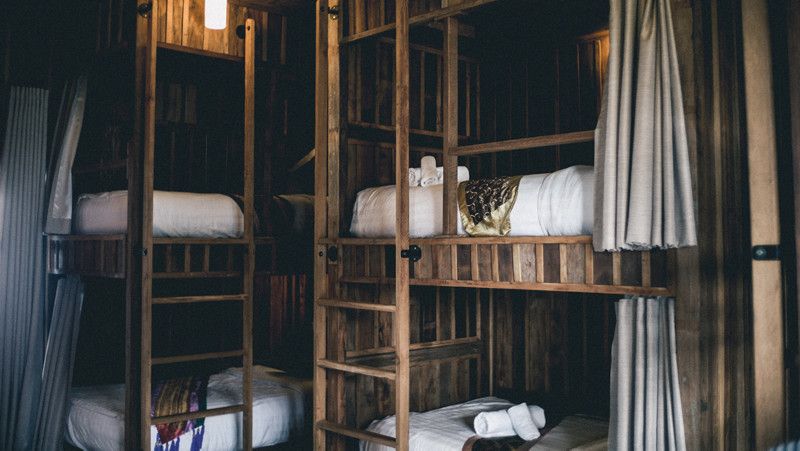
Hostels are very social budget-friendly accommodations that are an alternative to hotels. The rooms are in a dorm style setup and there's around 8 beds in one room, but this ranges from 4 to 12 usually. Sometimes less, sometimes more, and a lot of the time there are also options for private rooms.
They have shared facilities like kitchens, bathrooms, and living spaces that are set up differently depending on the hostel. Some may be really private like a toilet, sink and shower all in one bathroom that's for a single person at a time - others might be set up like a public bathroom with stalls.
The shared facilities also include places like common rooms with couches, cushions, pools, and bars for guests to relax and socialize. Speaking of which, guests are usually aged between 18 and 35 - as youth hostels usually exist because this group is more interested in budget travel, than older groups.
What Facilities Do Hostels Have?
Hostels have many facilities ranging from your basics like bathrooms, common rooms, and laundry rooms - to small luxuries like a little gym, a pool, or games room.
There's a wide range of facilities, perks, and drawbacks that you'll need to consider before booking a hostel, but you'll realize what's important to you by trial and error. In our opinion, the most important things to look out for are;
- Beds & Dorms
- Bathroom facilities
- Common areas
- Air-conditioning/Heating
- Internet
- Laundry rooms or services
- Kitchen facilities
We'll break down what to consider for each one, what to expect, and how to find out more.
Beds & Dorms
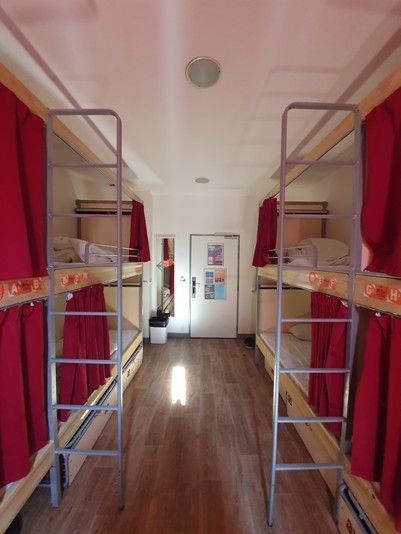
The beds in hostels as a rule of thumb are very comfortable. The hostels that rise to the top of platforms, with good reviews, can't skimp out on the most basic aspect of a hostel - so there shouldn't be any worries there.
The beds will usually be bunk beds, with various frames. Sometimes they're great, sometimes they creak, but the mattress itself is usually good quality like mentioned before.
There are many hostels that set the beds up as pods so it's a little zone of privacy - think things like;
- Curtains around the bed
- Personal universal power outlet
- A personal light
- Locker
- Built in night stand
Sometimes they very much feel like a bunker where no one can bother you, other times it's a few of those perks e.g. just a small curtain. However, the most common things you'll find near your bed is a power point and a small light.
On the topic of beds, and sleeping, you should definitely buy high quality earplugs and an sleeping mask for those times you're struggling to sleep - trust me, it'll be worth it.
- Amazon link for earplugs - https://amzn.to/2E0SeAz
- Amazon link for sleeping mask - https://amzn.to/2thCbMt
Bathroom Facilities
Hostels have wide ranging setups for bathroom facilities. Bathrooms can be private with all fixtures in one place, intended to be used by one person at a time. They can be in a public bathroom style with a row of sinks, a row of toilets, and a row of showers - it all depends on the hostel you book.
This is one of the main aspects hostels focus on second to beds. So you can expect good quality toilets, showers, and other fixtures from well reviewed hostels.
Good hostels will tend to have other perks with bathroom facilities, such as having blow dryers, towels, fully supplied soaps and shampoos along with other helpful accessories.
However, a lot of hostels won't have all of these, in fact some won't have any. So consider bringing a few things with you.
- Toiletries - small shampoos, soaps, toothpastes etc.
- Flip flops - to wear for showering #hygiene
- A travel towel - thin, quick dry, and light weight, will save you money on renting them constantly.
Amazon link to a good one: https://amzn.to/2s92EeC
Common Areas
Hostels are usually set up to promote interaction between the guest. This is done in many different ways but they all revolve around communal areas. This could be;
- Common rooms
- Outside patios
- Pools
- Game rooms
- Big dining tables
These areas are the life blood of a hostel and they're where you'll meet other backpackers, where games nights will be hosted, and where a lot of socializing and drinking will happen. If a hostel doesn't look like it has a common room, expect there to be little to no socializing.
Other Facilities & Amenities
There are a few other things to make sure a hostel includes. These might not be pivotal to having a great stay, but they sure help. A lot of hostels will have these by default, but checking the reviews should be easy enough.
- Good Air-condition/heating - This can make all the difference in a hot or cold climate, and in some cases is a necessity for instance, during winter travel.
- Working internet connection - Slow internet can be a pain, but no internet might screw up planning for transport, bookings, things to do and more. Make sure the internet is working (recent reviews).
- Kitchen facilities - In more expensive destinations make sure that the hostel has a fully equipped kitchen - that is, if you're looking to cook and save money.
- 24 hr reception - This may not be important depending on when you're checking in, but if you're checking in late, look up if the hostel has options for late check-in or a 24 hr reception.
Different Types of Hostels
Youth Hostels
Youth hostels are the regular kind of hostel you'll come across. They will have all the basic amenities, great facilities, and every essential aspect of a hostel. The atmosphere will be social but nothing too crazy, and you'll meet a lot of people who are really excited about traveling - treat these hostels as a nice bed, and social circle for your travels.
Some will traditionally have the age restrictions of 18 to 35 mainly targeting young travelers - but rarely is this enforced, and you shouldn't have a problem if you're older.
Note: You'll see age restrictions on each hostel listing so make sure to check before booking or ask at reception.
Party Hostels

These hostels are specifically for party goers looking to party overseas. Expect loud music, drinking games, going out every night, and some memories you'll either never forget or forget instantly 🥂
The atmosphere at these hostels are very much that of a college style frat or sorority. Backpackers constantly running aloof, or relaxing by the pool, or downing drinks back to back during happy hour.
These hostels are usually cheaper than normal hostels, even though the facilities and amenities are as good or better than other hostels. The reason being is that the activities on offer are where they make their money - and of course when everyone's doing it, you do it too. Think bar crawls, parties, and other events.
There's definitely less privacy bu you'll make instant friends, and see everyone at their best and worst, and soon enough everyone is very comfortable around each other.
Full article on party hostels below:

Hotel Style Hostels
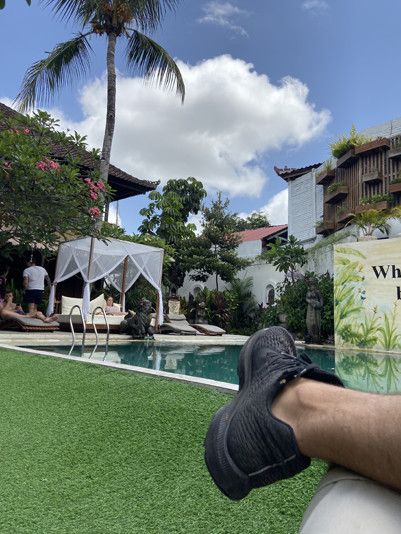
There are some hostels that are set up to resemble resorts, and other higher end hotels. They're still hostels, the dorms exist, the social aspect exists but they're specifically for relaxing. Expect lazing around by the pool, free breakfasts, massages, cocktails, and whatever else you'd see in a resort.
And just like a resort, these hostels will be more pricey. That being said, they're more expensive relative to a hostel but still cheaper than a mid range hotel. It's a great mix of both worlds, and with noise usually not being an issue here - it's the perfect relaxing getaway for backpackers.
The facilities will usually be above and beyond what you'd expect at a hostel. Air-conditioning and fans running consistently, clean and modern bathrooms, beds almost being double yet still remaining in a dorm style. Of course all of this varies depending on where you go.
Activity Specific Hostels
Some hostels are located in a hot spot travel location where the most popular activity is what draws all the people. This activity might be surfing, hiking, diving, or working remotely. So hostels pop up that are specifically to house these travelers, and other like minded people.
A surf hostel will offer surfing activities, and a hiking one will have trails and tours every day. These are perfect for people who are in a particular place to do a particular thing and need some cheap accommodation.
It's worthwhile noting that these hostels aren't unique, they have the same facilities that the other hostels have, it's the activities that are the key differentiation - and of course the shared experiences that come with it.
How Much Do Hostels Cost?
These prices are based on averages throughout both high and low seasons, and the figures are from 2020 listings across accommodation platforms like Hostelworld and Booking.
| Travel Location | Average Price | Average Quality |
|---|---|---|
| Asia | $10-$30 | 9.5/10 |
| Australia & NZ | $15-$30 | 8/10 |
| Canada | $25-$30 | 8/10 |
| Central Europe & UK | $25+ | 8/10 |
| Eastern Europe | $7-$15 | 8.5/10 |
| Middle East | $7-$15 | 8/10 |
| South America | $7-$15 | 8.5/10 |
| South East Asia | $5-$15 | 9.5/10 |
| United States | $25-$35 | 8/10 |
As you can see, prices vary across the world for hostels but the quality is always good. Some are better than others, but again it really depends on the hostel.
If you're looking to get even cheaper hostel prices, travel during low season, and consider free alternatives for accommodation. Full articles on both below.

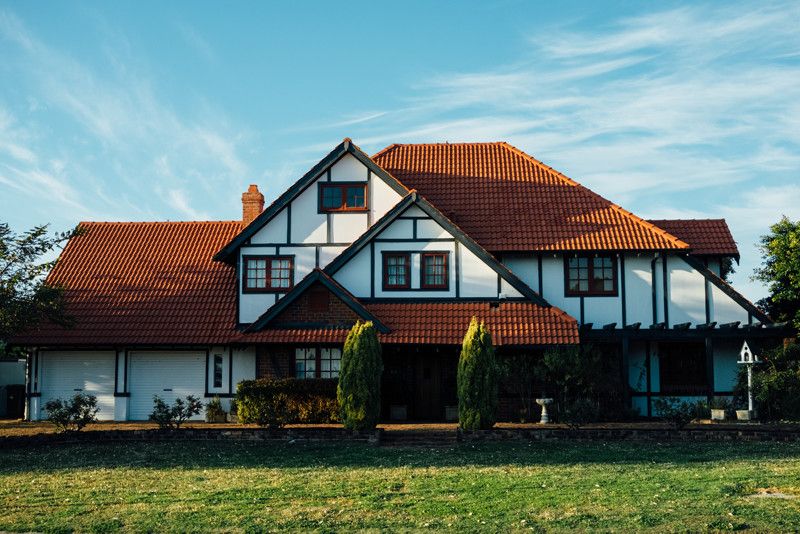
Should You Stay in a Hostel?
There will always be a trade-off of advantages and disadvantages to staying in a hostel as opposed to other accommodation like a hotel.
Hostels will allow you to pay cheaper prices, meet other travelers, and socialize, at the cost of privacy and potential for disturbance. The benefits may or may not outweigh the costs for you. So we've broken them down below, but if you want a quick answer, here it is:
In general, you should absolutely stay in a hostel. We've found that for most people traveling on a budget, hostels are becoming the best option - and they keep getting better. They provide nearly everything a hotel would, all for a fraction of the price.
But if you want the full breakdown to judge for yourself and your own needs, please continue to the pros and cons list below.
Pros of Staying in a Hostel
Hostels are not only cheaper, and more social than hotels, but these days, the popular ones will also have better facilities and more comfortable beds than your mid range hotel. Hostels in South East Asia especially will go above and beyond when it comes to the quality of facilities.
- Built in social circle of travelers
- Cheapest travel accommodation
- Solo traveler friendly
- Usually includes breakfast, tours, other information
- Quality amenities like air-conditioning, internet, late check-in and more - depending on the hostel
- Beds are usually very comfortable
- Facilities like bathrooms are usually quite modern
- Each hostel is unique in terms of decor and atmosphere
- Hosts activities, games, and events
- Efforts for privacy and convenience such as curtains around beds, and personal lights, lockers, power outlets, free earplugs
These pros are looking at a combination of the very best a hostel can offer. Whether the hostel you stay in has all of these, depends on the hostel - and this is where looking at reviews and doing your research comes in.
Some might not include a breakfast, and not have curtains around the beds - but they may have a pool and a great social atmosphere. Others may be extremely private, but lack in atmosphere or a common room - the very best hostels with the highest reviews, have a good mix of all of these perks.
Cons of Staying in a Hostel
The key benefit of a hostel is how social and communal it can be. That benefit also contributes to the potential disadvantages like lack of privacy, noise, trouble sleeping, higher potential for disputes, potential security issues. Lets breakdown the cons of staying a hostel.
Please note that just like many hostels don't have all the benefits listed above, most also don't have a lot of the disadvantages listed here. Hostels go to great lengths to prevent and minimize the disadvantages.
- Lack of privacy in dorm style rooms
- Noise while sleeping, like snoring
- Communal use of bathrooms can lead to cleanliness problems
- Potential for theft or misplacing of items
- More rules around food, alcohol, cigarette consumption - some hostels also have bars so they won't let you bring in outside drinks
- Potential for fewer amenities or lack in quality depending on the hostel
- Limited services and inclusions on average compared to hotels e.g. supplying a towel, toiletries, airport pickup services - though a lot also do
The disadvantages of staying in a hostel can be very real, though are more vivid on paper. Lack of privacy can be a big issues if you're a private person, and the noise might be an issue depending on what type of hostels you're staying in, as discussed above - but if you're generally social and are looking for people to meet, these really aren't cons.
Some of these disadvantages can be prevented by selecting the right type of hostel, others can be prevented by checking the reviews, and a few can be prevented by making sure you have the right gear, for instance, trouble with sleeping? Make sure you get some high quality ear plugs and a sleeping mask.
- Amazon link for earplugs - https://amzn.to/2E0SeAz
- Amazon link for sleeping mask - https://amzn.to/2thCbMt
Tips and Suggestions for Staying in Hostels
There are more than a few fantastic benefits to staying in a hostel that we want to maximize, and there are also some disadvantages that we want to minimize. We've got a list of tips that will help you do just this.
How to Find a Great Hostel
What makes a hostel great, what to watch out for, and how to find the one that is right for you.
- You can search for hostels on many online platforms but the best one that's hostel specific is Hostelworld.
- When looking for a hostel with the social aspect in mind, make sure you sort by or consider the 'atmosphere' rating for the hostel (this is on Hostelworld).
- Check the recent reviews and look out for people mentioning bed bugs, internet issues, cleanliness issues etc. these are timely issues and even though a hostel may be ranked well - in recent months they could have dropped the ball.
- If you're on a popular travel circuit, ask the people in your current hostel for recommendations as some have likely already been where you're going.
- Never initially book more than 2 days in a hostel - This gives you a chance to try it out before extending, and you avoid having to leave and pay out the rest of your stay because it was a bad hostel.
- Check to see all inclusions before booking a hostel - Especially in Europe, hostels will quote a price but when you get there, you'll find out that sheets, towels, breakfast, coffee, and even luggage storage isn't included. This predatory behavior is prevalent, however, fortunately they need to include it in the listing, make sure you check beforehand.
How to Sleep in a Noisy Hostel
Maybe you really like the social aspect, and you really want to stay because the atmosphere is on point, but the hostel is just too noisy and you can't get enough sleep. There's many ways around this:
- Ask to change rooms - Hostel rooms are split across levels, or areas and some are closer to the communal areas than others, find the ones that are out of the way, and try to get them to move you there.
- Make sure you're tired before you go to bed - The backpacker lifestyle is absolutely tiring, which is one of the reasons why people don't usually struggle sleeping in a hostel - if you are struggling, you might need to get out and do more the next day.
- Put on some earplugs - Hostels will usually have free earplugs at the reception, they're not the best but they still drown out the noise to a decent extent. I recommend getting some high quality earplugs if you haven't left for you trip yet - Amazon link for earplugs - https://amzn.to/2E0SeAz
- Get a sleeping mask - This won't help with the noise, but especially towards the morning when the light comes through, it really helps you get a couple more hours in when everyone's still fast asleep - Amazon link for sleeping mask - https://amzn.to/2thCbMt
What Should You Bring to a Hostel?
There are a lot of things that hostels provide, and some things that they don't. The listing usually has it all written down but it's worth always having a few things on you.
- A good lock - Hostels will have lockers to put your stuff away, but usually don't have a lock, you need to bring your own, which is great as you'll have the only key.
- Toiletries including small amounts of shampoo and soap - Some hostels are really good when it comes to providing the essentials, they go above and beyond, but others don't. Make sure you have the essentials with you just in case.
- A pair of flip flops - The cleanliness is usually on point, but all the bathroom areas are definitely communal so this way, you're covered in terms of hygiene.
- A quick dry travel towel - These are thin, and lightweight, they're not wet for long and they don't hold a lot of bacteria. Very easy to wash and are perfect for traveling and hostels, as a lot of the time, hostel will charge a fee for a towel - Amazon link to a good one: https://amzn.to/2s92EeC
One other thing you should consider with hostels and backpacking in general is to travel light. Sometimes lockers are small and won't fit large bags. And traveling light in general makes it easy for you to jump around from hostel to hostel even just by walking with your minimalist backpack of things.
We recommend traveling carry-on only whenever you can, and it's easier than what you might think. Look below for our review of the best backpack to do this with.
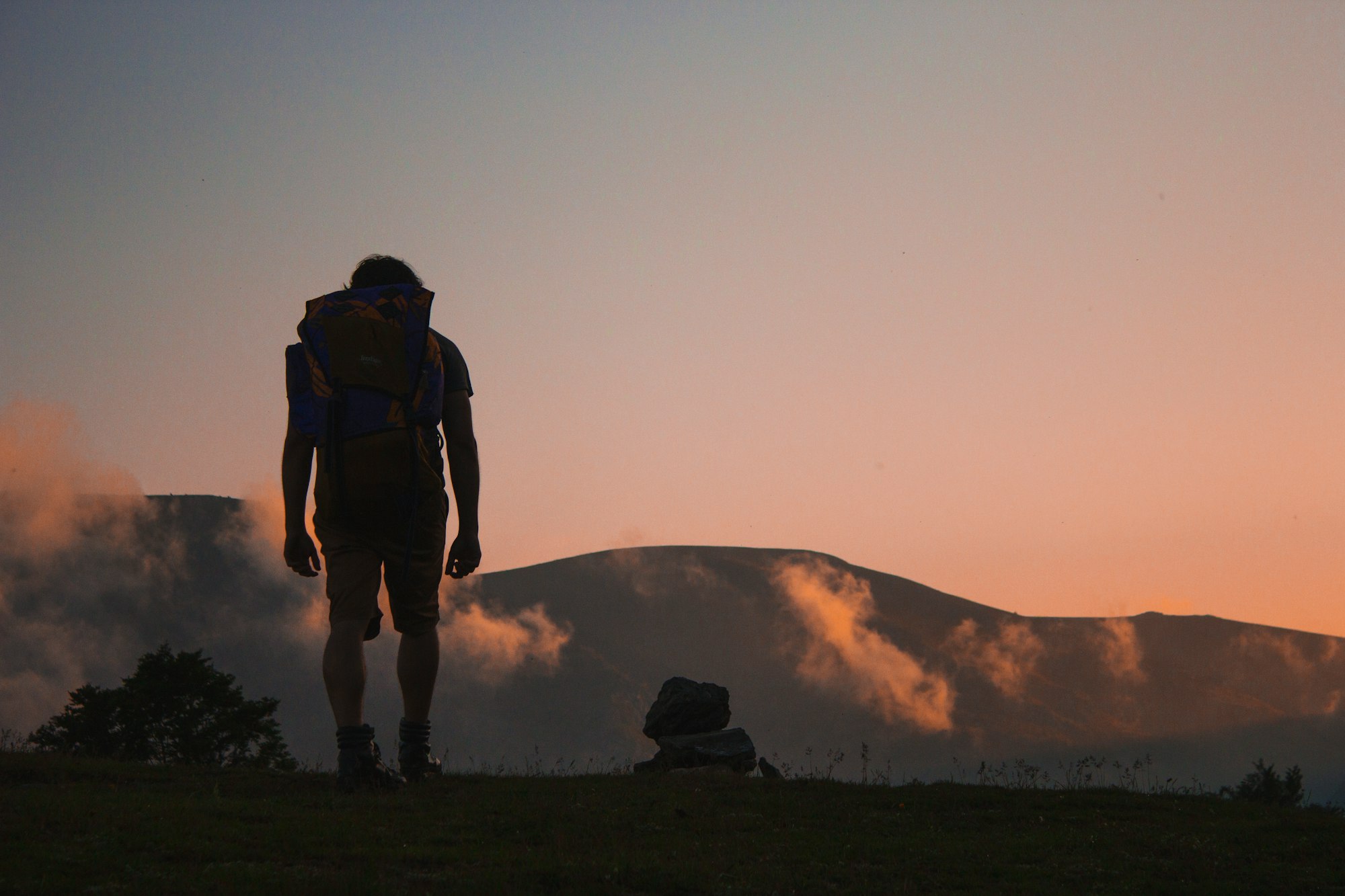
Safe travels!
Sah

